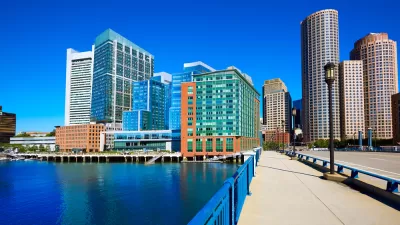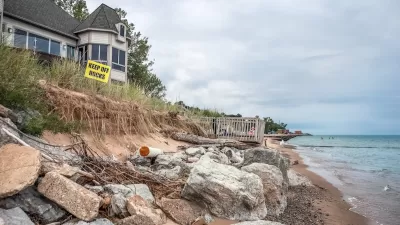A grant-funded research team will evaluate solutions for shoring up the area’s flood protection strategies and improving access and service on the Blue Line for local residents.

A study by A Better City will examine how improving Boston’s Blue Line can help mitigate the effects of climate change and protect public transit infrastructure on the city’s east side from rising sea levels, reports Grecia White for Streetsblog Massachusetts.
“As one of the few ways people can access Boston proper from East Boston without a car, the Blue Line is a critical transportation corridor that’s vulnerable to climate-related impacts and also to socio-economic pressures like gentrification.” According to the article, “The project, Greening the Blue Line, a collaboration between ABC, Civic Space Collaborative, and Weston and Sampson, will be evaluating the potential for nature based solutions to protect critical transportation infrastructure from coastal and stormwater flooding, and uplift communities along the Blue Line and East Boston, according to [Kate Dineen, Executive Vice President of A Better City].”
The study will assess “nature based solutions” for managing flooding and protecting transit stations and infrastructure near two Blue Line stations, Wood Island and Orient Heights. “At the end of the project, the team will share conceptual design approaches such as sketches and renderings for nature based solutions that could be implemented in key areas near these stations to help mitigate coastal flooding.”
FULL STORY: Blue Line in East Boston Is the Focus of Ongoing Climate Change Mitigation Study

Planetizen Federal Action Tracker
A weekly monitor of how Trump’s orders and actions are impacting planners and planning in America.

Maui's Vacation Rental Debate Turns Ugly
Verbal attacks, misinformation campaigns and fistfights plague a high-stakes debate to convert thousands of vacation rentals into long-term housing.

Restaurant Patios Were a Pandemic Win — Why Were They so Hard to Keep?
Social distancing requirements and changes in travel patterns prompted cities to pilot new uses for street and sidewalk space. Then it got complicated.

In California Battle of Housing vs. Environment, Housing Just Won
A new state law significantly limits the power of CEQA, an environmental review law that served as a powerful tool for blocking new development.

Boulder Eliminates Parking Minimums Citywide
Officials estimate the cost of building a single underground parking space at up to $100,000.

Orange County, Florida Adopts Largest US “Sprawl Repair” Code
The ‘Orange Code’ seeks to rectify decades of sprawl-inducing, car-oriented development.
Urban Design for Planners 1: Software Tools
This six-course series explores essential urban design concepts using open source software and equips planners with the tools they need to participate fully in the urban design process.
Planning for Universal Design
Learn the tools for implementing Universal Design in planning regulations.
Heyer Gruel & Associates PA
JM Goldson LLC
Custer County Colorado
City of Camden Redevelopment Agency
City of Astoria
Transportation Research & Education Center (TREC) at Portland State University
Jefferson Parish Government
Camden Redevelopment Agency
City of Claremont





























